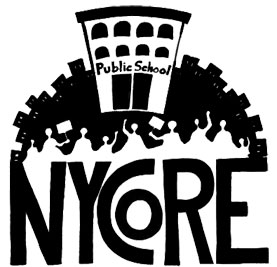Mission
New York Collective of Radical Educators (NYCoRE) is a group of current and former public school educators and their allies committed to fighting for social justice in our school system and society at large, by organizing and mobilizing teachers, developing curriculum, and working with community, parent, and student organizations. We are educators who believe that education is an integral part of social change and that we must work both inside and outside the classroom because the struggle for justice does not end when the school bell rings.
Points of Unity- Revised 2014
1. We have a responsibility to address racism and neoliberalism as it impacts our students, our profession, and public education as a whole.
Racism and neoliberalism are driving forces in educational systems, policies and practices. These forces maintain and perpetuate the systematic and historical oppression of people of Color and working class communities while disproportionately benefiting White and economically wealthy communities. As educators we have a responsibility to address the ways in which these forms of oppression in solidarity with our students, their families, and the broader communities with which we work.
2. We believe there are positive alternatives to high stakes, standardized testing
We oppose high stakes standardized testing because it is a tool of corporatization, stratification, and social reproduction. High stakes testing provides an inaccurate and incomplete assessment of learning, consumes valuable instructional time, and stifles pedagogical innovation and critical thinking. Negative sanctions tied to low test scores disproportionately impact marginalized students, schools and teachers that serve them. We support creative approaches to develop local, holistic assessments that provide more insight than a one-size-fits-all exam.
3. We believe in restorative justice as an alternative to punitive disciplinary measures.
Punitive disciplinary measures disproportionately criminalize students of Color and youth with special needs, and are not an answer to crime and other social problems. Disciplinary approaches that emphasize restorative justice help to interrupt the school-to-prison pipeline and foster community accountability.
4. We oppose the militarization of education.
We oppose the militarization of education in any form– whether through military recruitment at school sites, policy changes that encourage marginalized students to enlist or other measures. We believe that these efforts are an extension of an imperialistic strategy to maintain a powerful military force in order to protect and promote US world dominance.
5. We believe school funding policies should ensure equitable resources for all.
The prevailing funding structure based upon property taxes discriminates against low-income communities and urban areas, which disproportionately affect people of Color. Approaches to educational “reform” that relies on private philanthropy, venture capital, and other non-public forms of funding are part of a broader trend of divestment from public education. Funding high-quality and equitable public education is a public responsibility that should be shared for the benefit of the common good.
6. Schools must be safe spaces for everyone, regardless of how they identify or are perceived.
People who identify as (or are perceived as being) women/girls, gender nonconforming, lesbian, gay, bisexual, transgender, queer or questioning (LGBTQ and beyond) receive a disproportionate amount of the verbal and physical abuse that takes place in schools. The targeting of these groups is extremely prevalent, and cannot be tolerated. All faculty, staff, and administrators must challenge this type of behavior and help develop spaces in which all people feel free to express themselves without fear.
7. Schools should be places of questioning and critical thinking.
The present educational system is derived from an assembly line model that stifles critical thinking by focusing on the regurgitation of facts and information. We believe that all students deserve school environments, teachers and curricula that are relevant and responsive to their communities. Teaching and learning should enable students to see themselves as transformative agents of change.
8. We believe schools are part of their communities.
Schools should provide a neighborhood space through which all community voices are heard. Teachers are an integral part of this space and must be held accountable to the community by being involved in addressing community needs.
9. We believe students with special needs deserve an environment where they can flourish.
Our education system promotes a deficit-based framework in which not all students can thrive. The mistreatment, miseducation, and misidentification of youth in regards to special education is a manifestation of this model. Schools must be spaces in which all students receive holistic support and academic, social, emotional, and health services that are true to their individual needs.
10. We believe in the power of labor unions as a vehicle for social change.
The labor movement is a critical part of our radical heritage and an important place where working people have collective power and voice in large number. Although the bureaucracy and lack of transparency in most unions has disillusioned many members, it is because of unions that working people have contractual protections and collective bargaining rights at all. Teacher unions are a vital force in the fight against total privatization; they have the potential to unite parents, educators and students to defend and improve public education.
11. In order to combat economic, social, and political systems that actively silence people of Color and women, NYCoRE is committed to being an antiracist, antisexist organization. We maintain a majority of women and people of Color representation in our leadership and strive to do the same in our membership.
NYCoRE Political Goals
Goal #1: To raise consciousness of the social inequities fostered in public schools settings, and teachers potential roles in reproducing or resisting them.
Goal #2: To initiate action around educational justice issues.
Goal #3: To link educators to the broader social justice movement through social action and educational justice work.
Goal #4: To facilitate coalition building between educators, parents and students.
Goal #5: To promote liberatory educational practice and classrooms, and schools.

